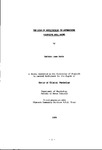THE ROLE OF EXPECTATIONS IN DETERMINING CAREGIVER WELL-BEING
| dc.contributor.author | Foote, Kathryn Jane | |
| dc.contributor.other | School of Psychology | en_US |
| dc.date.accessioned | 2013-10-31T11:43:41Z | |
| dc.date.available | 2013-10-31T11:43:41Z | |
| dc.date.issued | 1993 | |
| dc.identifier | NOT AVAILABLE | en_US |
| dc.identifier.uri | http://hdl.handle.net/10026.1/2499 | |
| dc.description.abstract |
In recent years there has been a growing body of literature regarding the experiences and well-being of people providing care to a relative with dementia. There is some evidence within this literature that sub-groups of caregivers respond differently to the caregiving situation. In particular, findings have tended to suggest that women caregivers experience more burden and distress than men ( eg Gilhooly, 1984a; Gilleard et al , 1984) , and that spouses of the care recipient experience more burden and distress as carers than children (eg George & Gwyther, 1986; Gilhooly, 1984a). Various explanations have been postulated, one of which focuses on caregivers' expectations of themselves in providing care: it has been speculated that women may have higher expectations of themselves (eg Schnoover et al, 1988), due to a sense that in providing care they are fulfilling an appropriate or anticipated role. It is suggested here that a similar argument may be extended to spousal caregivers. This study, then, aimed to investigate the levels of expectation of 27 caregivers, and any role this factor may play in determining levels of burden and distress. Differences between the expectations of women and men, and spousal and child caregivers were also investigated, as was the effect of expectations on the use of social support. Contrary to hypotheses, it was found that expectation levels were inversely related to levels of burden, and there were no differences between sub-groups. There was evidence of differentia1use of support for caregivers with different levels of expectation: those with higher expectations of themselves reporting the availability of more informal supports, but lower frequency of contact with services than those with lower expectations. The results provide a characterisation of the more burdened caregivers being those who have lower expectations of themselves to provide care, who are less involved in caregiving and receive more support in the role. Potential explanations for these findings are discussed, limitations imposed by the methodology of the study are outlined and clinical implications of the present results are considered, | en_US |
| dc.description.sponsorship | Plymouth Community Services N.H.S. Trust | en_US |
| dc.language.iso | en | en_US |
| dc.publisher | University of Plymouth | en_US |
| dc.title | THE ROLE OF EXPECTATIONS IN DETERMINING CAREGIVER WELL-BEING | en_US |
| dc.type | Thesis | |
| plymouth.version | Full version | en_US |
| dc.identifier.doi | http://dx.doi.org/10.24382/4737 | |
| dc.identifier.doi | http://dx.doi.org/10.24382/4737 |
Files in this item
This item appears in the following Collection(s)
-
01 Research Theses Main Collection
Research Theses Main


